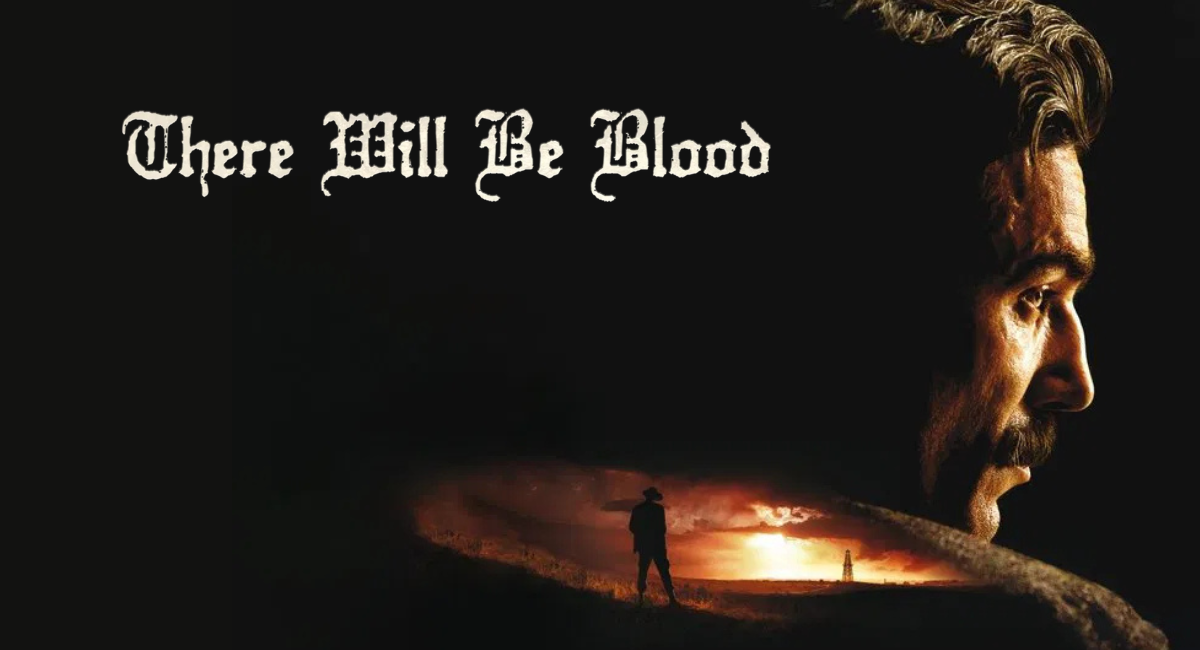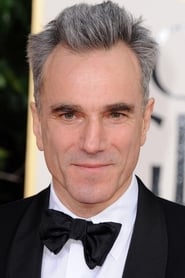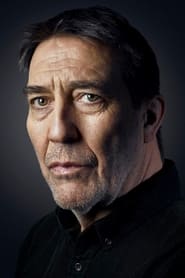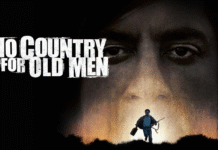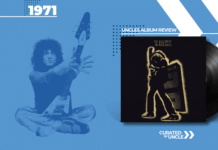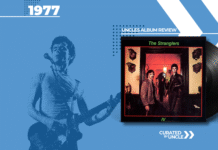There Will Be Blood (2007): Strike Oil or Die Trying
Paul Thomas Anderson’s 2007 epic There Will Be Blood is about as cheerful as a tax audit during a funeral. Set against the dust-blasted backdrop of early 20th-century California, it’s a cinematic sermon on the church of greed, delivered with fire and brimstone by Daniel Day-Lewis as Daniel Plainview – a man who treats human empathy the way most people treat parking tickets.
Adapted loosely from Upton Sinclair’s novel Oil! (note the exclamation mark, as if the book itself is screaming for mercy), There Will Be Blood is less a traditional narrative and more a sustained psychological excavation. It’s the cinematic equivalent of watching someone win Monopoly by flipping the board and punching the banker.
Table of Contents
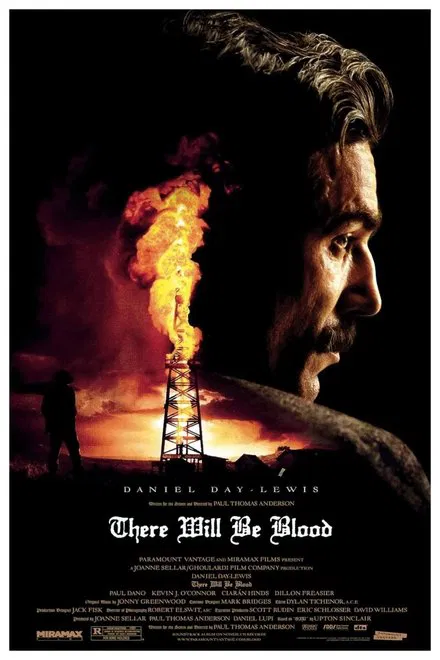
Meet Daniel Plainview, Your Favourite Sociopath
Daniel Plainview isn’t your run-of-the-mill anti-hero. No, he’s capitalism in human form: silver-tongued, single-minded and with all the warmth of a meat locker. When we first meet him, he’s literally clawing metal from rock like a demon with a pickaxe. The film wastes no time telling us this man will stop at nothing to make a buck, even if he has to step over your grandmother to do it.
Day-Lewis, in what might be the most committed performance since Marlon Brando yelled from a balcony, creates a character who oozes charm and venom in equal measure. Whether he’s pretending to care about small-town families or explaining how much he hates people (with all the sincerity of a nun at confession), he is magnetic. You don’t so much watch him as endure him.
Cast Breakdown: Or, Meet the People Daniel Plainview Intimidates into Oblivion
- Daniel Day-Lewis as Daniel Plainview
The human embodiment of capitalism with a moustache sharp enough to cut through contracts and souls. Delivers a performance so intense it could drill for oil without tools. - Paul Dano as Paul and Eli Sunday
Twin brothers or spiritual foils? Either way, Dano plays both with enough nervous energy to power a small chapel. As Eli, he tries to harness God’s power to counter Plainview’s money and fails spectacularly. - Dillon Freasier as H.W. Plainview
The adopted son turned emotional pawn. Looks like a sweet kid, which is essential when your father is the devil in a waistcoat. - Ciarán Hinds as Fletcher Hamilton
Plainview’s silent business partner. Exists mostly to nod, look vaguely disturbed and not get murdered. - Kevin J. O’Connor as Henry Brands
A mysterious man claiming to be Daniel’s brother. Spoiler: he’s not. But in a film full of lies and land grabs, he fits right in until he’s conveniently… retired. - Russell Harvard as Adult H.W. Plainview
Grows up, finds a voice (sign language, appropriately symbolic) and finally leaves Daddy Dearest. Possibly the only character with a shred of moral integrity left by the credits.
Oil, Land and the Art of Screwing People Over
The plot revolves around Plainview’s slow, methodical rise to power. He discovers oil, manipulates landowners and generally behaves like Jeff Bezos’ evil twin. Enter Paul Dano, who plays not one but two characters (the film’s only nod to two-for-one deals): Paul Sunday, who tips Daniel off to the oil-rich land and Eli Sunday, a self-styled preacher with all the charisma of a damp washcloth but the ambition of a Bond villain.
The relationship between Plainview and Eli is the film’s simmering core. Eli is the Jesus to Daniel’s Mammon, except instead of turning water into wine, he’s trying to turn oil into influence. Their power struggle plays out like a theological wrestling match, with each trying to out-gaslight the other
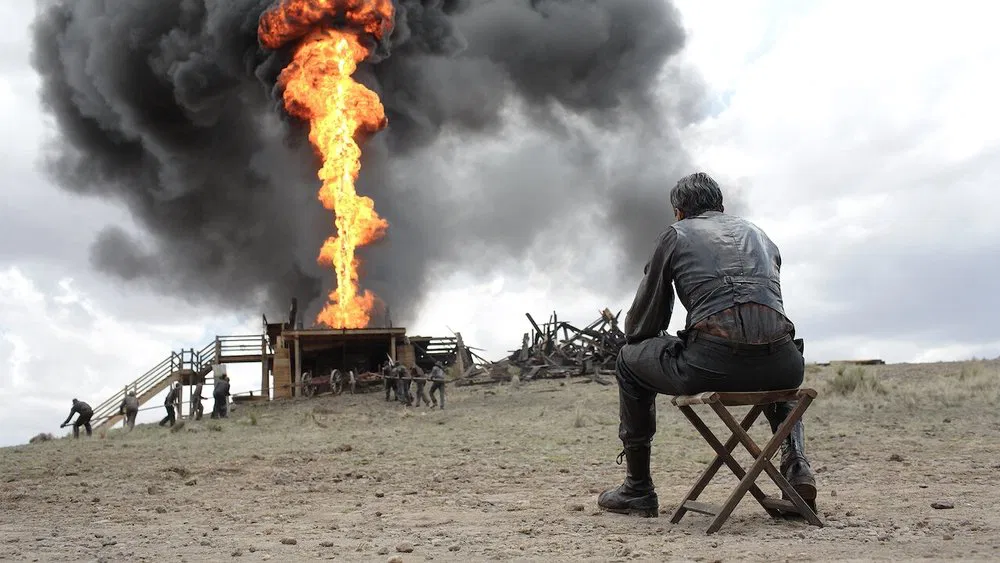
Let’s Talk Cinematography – Or How Bleak Can One Desert Look?
Robert Elswit’s Oscar-winning cinematography is so stark and unforgiving it could be used to interrogate prisoners. Every frame is drenched in dust, shadows and the eerie silence of a land waiting to be bled dry. Anderson’s direction is methodical, almost surgical – he lets scenes breathe, or rather, choke. There’s little dialogue for long stretches and when characters do speak, it’s often loaded with more tension than a nuclear summit.
Jonny Greenwood’s score, meanwhile, sounds like what you’d hear if anxiety had an orchestra. Jarring strings and industrial hums inject a constant sense of dread, like the film itself is trying to crawl under your skin and start drilling.
“I Drink Your Milkshake!” and Other Lessons in Diplomacy
By the time we get to the infamous bowling alley scene, Plainview is no longer a man – he’s a snarling id in a dressing gown. The film ends not with redemption or enlightenment but with a skull being metaphorically and literally cracked open. “I drink your milkshake!” has since entered the cultural lexicon, usually shouted by internet trolls and over-enthusiastic bartenders.
It’s one of cinema’s most bizarre yet perfect climaxes: a deranged oil tycoon beating a preacher to death with a bowling pin in a mansion echoing with madness. The American dream, ladies and gentlemen.
What It All Means: Greed, Power and the American Nightmare
Anderson isn’t subtle. There Will Be Blood is an indictment of unchecked ambition, religious manipulation and the lies we tell ourselves to justify ruining everything. It’s a bleak, brutal meditation on a country built on oil and obfuscation.
Daniel Plainview doesn’t just drill into the earth – he drills into the soul of the American psyche. He is what happens when capitalism sheds its last layer of civility and decides to dress like a frontier undertaker.
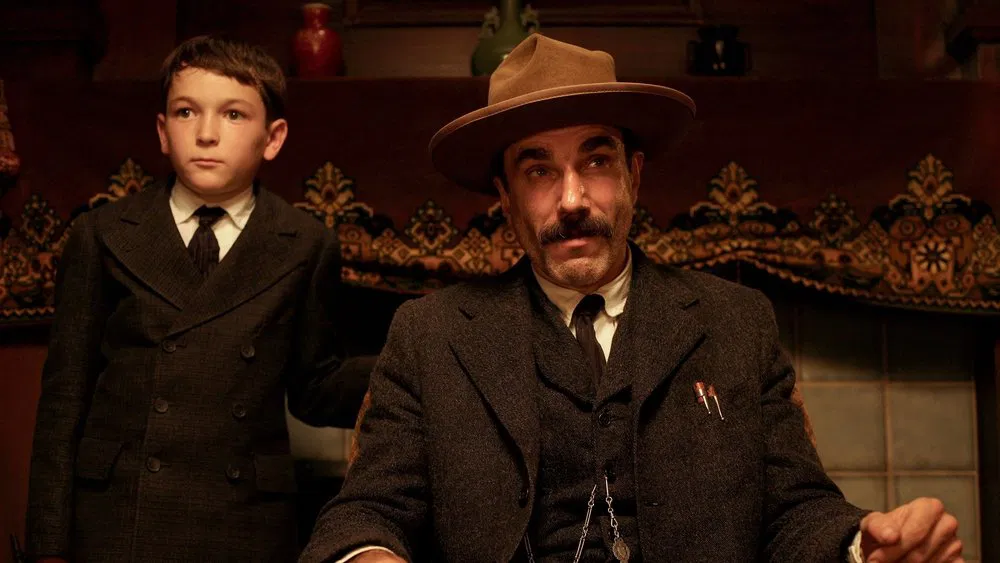
Performances: Day-Lewis and Dano’s Grim Dance
Let’s take a moment to appreciate Daniel Day-Lewis. This isn’t just acting, it’s soul possession. He disappears so fully into Plainview that you half expect him to start pitching oil shares in real life. Paul Dano, meanwhile, holds his own in a double role, especially in the scenes where his voice rises an octave with every lie he tells.
Their final confrontation in There Will Be Blood is one for the ages, a theological showdown turned bare-knuckle brawl. Plainview mocks, degrades and finally annihilates Eli, exposing the preacher as a fraud and himself as a monster who no longer cares about hiding it.
Sarcasm Break: Lessons From Daniel Plainview
- Want to make money? Pretend to love children and loathe people.
- Want land? Lie, charm and if that fails, bring dynamite.
- Want peace? Not an option. You’ll end up screaming in a mansion alone while a butler steps over a corpse.
It’s a feel-good story in the same way the Titanic was an innovative cruise.
Critical Reception: Critics Raved While Audiences Slowly Died Inside
Upon release, critics fell over themselves to praise There Will Be Blood. Awards were thrown at it like rose petals at a royal wedding. It won two Oscars – Best Actor and Best Cinematography – and was nominated for six others, including Best Picture and Best Director.
Audiences, meanwhile, were divided. Some were entranced by its slow-burn storytelling and moral complexity. Others just wanted someone, anyone, to smile. Spoiler alert: no one does.
Legacy: The Movie That Made Oil Sexy Again
There Will Be Blood has become one of the most dissected films of the 21st century. Its quotes, its imagery and its nihilistic view of the American dream have seeped into popular culture like an oil spill that no one’s quite finished cleaning up.
In film schools, it’s studied like scripture. On Reddit, it’s memed like gospel. And for fans of grim, intelligent cinema, it’s a high watermark, a reminder that movies can be art, even if the art in question looks like it wants to kill you.

There Will Be Trivia: Strange But True Facts
1. Daniel Day-Lewis scared the crew. Literally.
During filming There Will Be Blood, Day-Lewis was so convincingly intense as Daniel Plainview that some crew members reportedly avoided interacting with him off-camera. Method acting or actual demonic possession? You decide.
2. Paul Dano wasn’t supposed to play both Sunday twins.
Initially, only the character of Paul Sunday existed. When the actor originally cast as Eli dropped out mid-shoot, Dano stepped in last minute to play both roles. That’s one way to earn your paycheck and confuse the audience.
3. The oil derrick fire scene? Real.
That enormous oil fire wasn’t CGI it was an actual controlled blaze. The production had one shot to get it right and they did. The resulting smoke plume was so big it disrupted filming on No Country for Old Men, which was being shot nearby. Even Oscar-worthy nihilism has territorial disputes.
4. The infamous “milkshake” line came from an unexpected source.
That gloriously deranged “I drink your milkshake!” moment wasn’t a Paul Thomas Anderson original. It was lifted almost verbatim from a 1920s Congressional transcript about oil-drilling rights. Democracy: now with added dairy metaphors.
5. The bowling alley finale? Improvised madness.
Much of the final showdown was unscripted. Day-Lewis and Dano dove into character like lunatics at an exorcism convention, resulting in one of the most unhinged, iconic final scenes ever shot. The line “I’m finished” was both a closing statement and an exhausted sigh from everyone on set.
My Final Thoughts: Drink It All In
There Will Be Blood isn’t a movie you enjoy. It’s a movie you survive. It’s long, slow and soul-destroying – but in the best possible way. Daniel Plainview might be a monster, but he’s our monster, carved into cinematic legend by a performance that redefines intensity.
If you’re looking for an uplifting experience, watch Paddington. If you want to watch a film that burrows into your brain and starts hammering at your moral compass, this is it.
You may not leave smiling, but you’ll definitely leave impressed and maybe a little afraid of your next milkshake.

If You Like There Will Be Blood, I Recommend These Movies:
- No Country for Old Men (2007) – Because apparently 2007 was the year America stared into the abyss.
- Citizen Kane (1941) – The OG story of a man who gains everything and loses his soul.
- Nightcrawler (2014) – Another charming sociopath chasing success like it’s a blood sport.
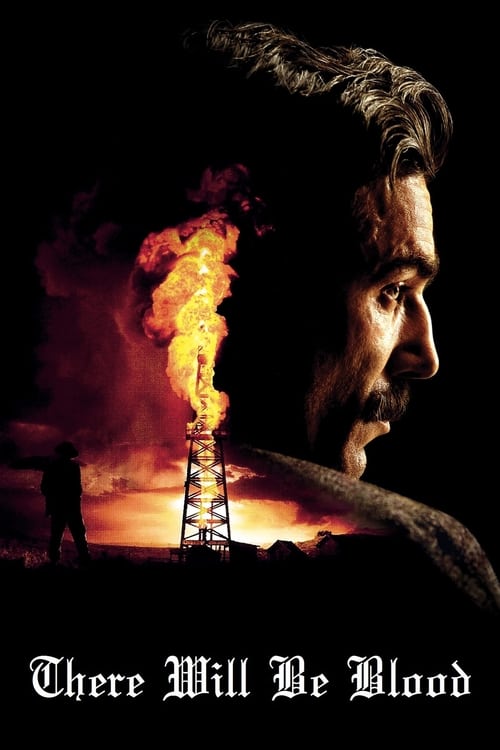
There Will Be Blood
Daniel Plainview
Paul Sunday / Eli Sunday
Henry
Fletcher Hamilton
H.W. Plainview
Elizabeth
Mary Sunday
H. B. Ailman



